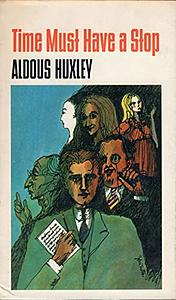You need to sign in or sign up before continuing.
Take a photo of a barcode or cover
reflective
slow-paced
Plot or Character Driven:
Character
Strong character development:
Complicated
Loveable characters:
Complicated
Diverse cast of characters:
N/A
Flaws of characters a main focus:
Yes
this was a super interesting read - it took me forever to finish because i kept leaving it to stew and then coming back to it. at the beginning i wavered back and forth between being committed to really liking it, it seemed more like fitzgerald (think ‘this side of paradise’) than the huxley i’d read previously, by a third of the way through i was completely hooked and invested in sebastian and eustace, the hilarity of their different flaws and their uncle/nephew dynamic. the epilogue was very interesting, huge parts of it were too abstract and philosophical for me and went straight over my head and other parts felt perfect for the ending of the book.
definitely one i’ll reread and something i would absolutely recommend to anyone with an interest in huxley. completely different to ‘brave new world’ but with all of the political commentary and a lot of the philosophy that winds through ‘the doors of perception’.
definitely one i’ll reread and something i would absolutely recommend to anyone with an interest in huxley. completely different to ‘brave new world’ but with all of the political commentary and a lot of the philosophy that winds through ‘the doors of perception’.
I really enjoyed the intermingling of philosophical discussion and a strong narrative. Aldous does a really great job meshing these two genres into a cohesive novel. I am a fan of most of Aldous Huxley's work, and this book definitely does not disappoint.
I find that Huxley’s novels have a tendency to annoy me in parts. This was the Huxley novel that annoyed me most, and by 200 pages in I thought it was the worst Huxley I had read. However, the final third, particularly the epilogue, really redeemed it for me.
Huxley himself was uniquely proud of this novel for how successful it was at blending idea with story. Sadly, it isn't successful at blending idea and story into something terribly enjoyable to read. The characters lack dimension (I'll get back to this). The plot - boy wants evening clothes - is unworthy of a writer of Huxley's power and brilliance, and the passages that are supposed to be comedic are just stupid. Weirdly, the book is both dry, and hurriedly paced.
One highlight: I have never read a death scene that so impeccably takes the reader through the experience of death. This sequence in the middle of the novel is a mesmerizing piece of writing (the scenes from the dead man's perspective following his death do not continue this momentum).
The epilogue, some 30 pages worth of wrap up, is unbearable. It is mostly made up of philisophical claptrap, although there are some prescient observations about the post WWII world to come (the book was published over a year before the end of the war). The final pages provide what passes for character development, but it's a chore to arrive at these conclusions and they don't really resolve anything.
Hate to say it, but would not recommend.
One highlight: I have never read a death scene that so impeccably takes the reader through the experience of death. This sequence in the middle of the novel is a mesmerizing piece of writing (the scenes from the dead man's perspective following his death do not continue this momentum).
The epilogue, some 30 pages worth of wrap up, is unbearable. It is mostly made up of philisophical claptrap, although there are some prescient observations about the post WWII world to come (the book was published over a year before the end of the war). The final pages provide what passes for character development, but it's a chore to arrive at these conclusions and they don't really resolve anything.
Hate to say it, but would not recommend.
"La memoria es la verdadera materia prima y sustancia de la poesía. Y la poesía es, desde luego, lo mejor que la vida puede ofrecer."
emotional
mysterious
reflective
medium-paced
Plot or Character Driven:
Character
Strong character development:
No
Loveable characters:
Yes
Diverse cast of characters:
Yes
Flaws of characters a main focus:
Yes
After reading Brave New World and The Island (best books ever), I was eager to read more of Huxley, so picked this up.
Time Must Have a Stop follows a young boy, with a conservative socialist upbringing, who spends the summer with his hedonistic uncle in Florence. Fun!
The protagonist is a poet and there's some interesting dialogue about the line between dreams and reality and how we idealise potential opportunities. Beyond this, the book has some good "moments" every now and again, but I wasn't that connected to the plot or characters. Sometimes, I truly felt that "time must have a stop". In the very final final pages, we get some typical Huxley and a super interesting philosophical discussion, but I was hoping I'd see clearer traces of this throughout the book. Upsetting but will continue with his other works and re-evaluate.
Time Must Have a Stop follows a young boy, with a conservative socialist upbringing, who spends the summer with his hedonistic uncle in Florence. Fun!
The protagonist is a poet and there's some interesting dialogue about the line between dreams and reality and how we idealise potential opportunities. Beyond this, the book has some good "moments" every now and again, but I wasn't that connected to the plot or characters. Sometimes, I truly felt that "time must have a stop". In the very final final pages, we get some typical Huxley and a super interesting philosophical discussion, but I was hoping I'd see clearer traces of this throughout the book. Upsetting but will continue with his other works and re-evaluate.



